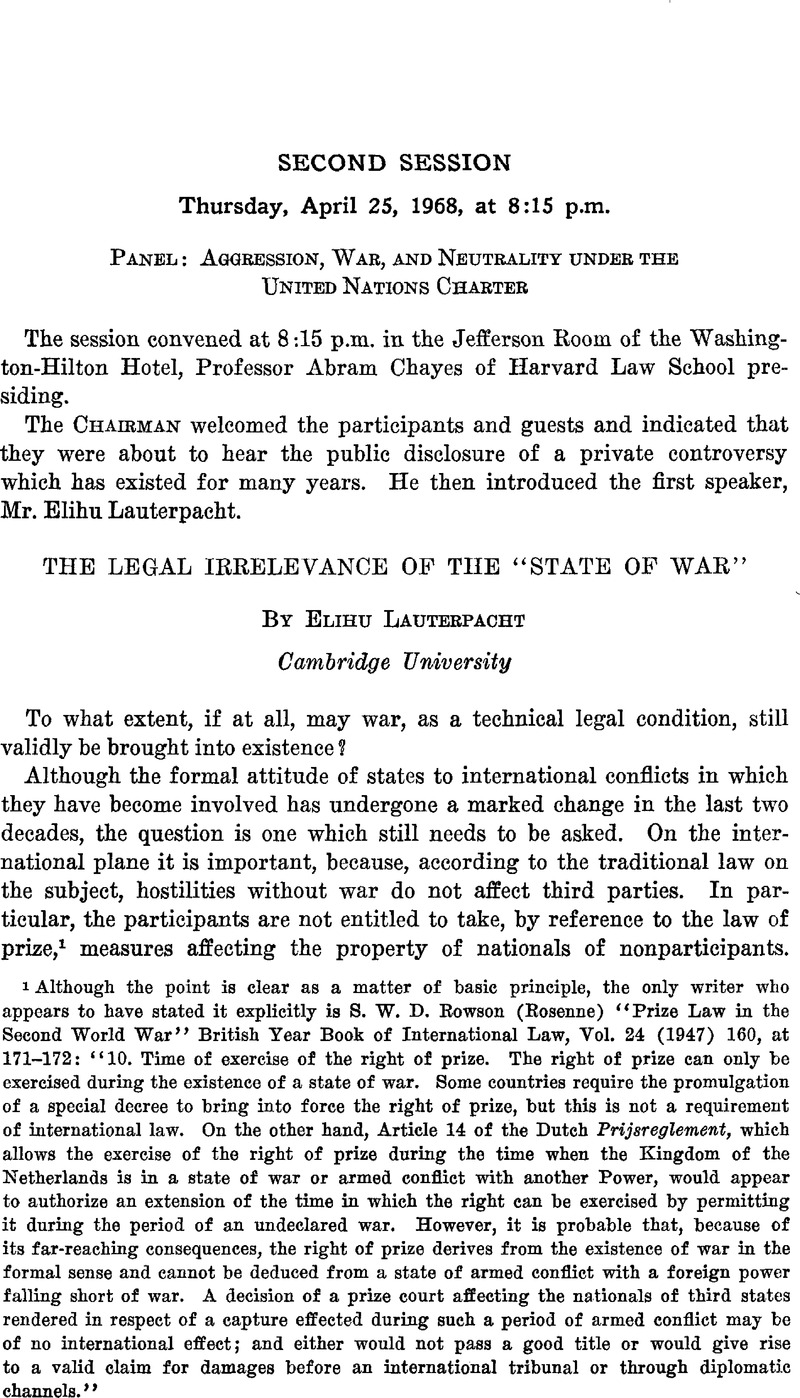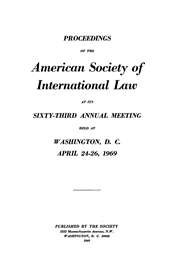Article contents
The Legal Irrelevance of the “State Of War”
Published online by Cambridge University Press: 27 February 2017
Abstract

- Type
- Second Session
- Information
- Copyright
- Copyright © American Society of International Law 1968
References
1 Although the point is clear as a matter of basic principle, the only writer who appears to have stated it explicitly is S. W. D. Rowson (Rosenne) “Prize Law in the Second World War” British Year Book of International Law, Vol. 24 (1947) 160, at 171-172:“10. Time of exercise of the right of prize. The right of prize can only be exercised during the existence of a state of war. Some countries require the promulgation of a special decree to bring into force the right of prize, but this is not a requirement of international law. On the other hand, Article 14 of the Dutch Prijsreglement, which allows the exercise of the right of prize during the time when the Kingdom of the Netherlands is in a state of war or armed conflict with another Power, would appear to authorize an extension of the time in which the right can be exercised by permitting it during the period of an undeclared war. However, it is probable that, because of its far-reaching consequences, the right of prize derives from the existence of war in the formal sense and cannot be deduced from a state of armed conflict with a foreign power falling short of war. A decision of a prize court affecting the nationals of third states rendered in respect of a capture effected during such a period of armed conflict may be of no international effect; and either would not pass a good title or would give rise to a valid claim for damages before an international tribunal or through diplomatic channels.” But see also The Nyugat, International Law Reports, vol. 24, (1957), p. 916, in which the Netherlands Supreme Court treated Dutch Prize Law as applicable to a Hungarian vessel seized prior to the outbreak of war. The circumstances were, however, rather special in that by the date of seizure Hungary had effectively become an “enemy” of Holland.
2 The International Law Commission in considering the law of treaties decided to omit from the draft Articles which it prepared any provision governing the effect of war upon treaties.
3 See, for example, Navios Corporation v. The Ulysses II, International Law Reports, Vol. 26, p. 638, involving the application of a cancellation clause in a charter party which was to become operative “if war is declared against any present N.A.T.O. countries.” It was held by the U. S. District Court and affirmed by the Court of Appeals that the statements made by President Nasser at the time of the Suez conflict constituted a “declaration of war” within the meaning of this clause.
4 Ibid.
5 See the cases reported in Annual Digest and Reports of Public International Law Cases, 1949, at pp. 557, 570, 574, 576, 577, 581, 587, 589, 590, 591, 594, 595, 597, 598, 601; and also “ T h e Fjeld,” International Law Eeports, 1950, p. 345; “ T h e Flying Trader,” ibid., p. 440; “ T h e Hoegh de Vries,” ibid., p. 447; “The Talthybius,” ibid., p. 448; “The Fedala,” ibid., 1957, p. 992; “The Captain Manoli,” Eevue Egyptienne de droit international, Vol. 15 (1959) p. 186; “The Lea Lott, “ ibid., Vol. 16, p. 109; “The Inge Toft,” ibid., p. 118; and The Astypalia, ibid., p. 130.
6 Thus in “The Fjeld,” see n. 1, p. 5, the Court said: “The existence of a state of war or of neutrality in so far as non-belligerents are concerned cannot be discussed by the Prize Court, for it is the duty of the Court to apply the law without examining its legality.” (p. 347).
7 See I.C.L.Q., Vol. 6 (1957) 521-522 for a statement to this effect by Lord Hailsham with reference to Egyptian measures taken against British property in 1956.
8 See Eowson (Bosenne) on “Modern Blockade: Some Legal Aspects” in British Year Book of International Law, Vol. 23 (1946), 346, at 352.
9 See Eosalyn Higgins, Development of International Law through the Political Organs of the United Nations, pp. 214-215.
10 In 1948 the TJ. S. Government protested against the detention of the S.S. Flying Trader, which had been seized on the grounds that it was transporting war materials which might later be transshipped to Israel. The TJ. S. protest was based on the fact that the TJ. S. did not recognize a state of war between Egypt and Israel and therefore did not recognize an embargo on goods going to Israel and that the action violated the guarantee of unobstructed transit of the Canal by all vessels. (See Whiteman, Digest of International Law, Vol. 3, p. 1088.) Denmark protested in respect of the seizure of the Inge Toft in 1959 (ibid., pp. 1096-7).
11 Op. cit., p. 25.
- 6
- Cited by




